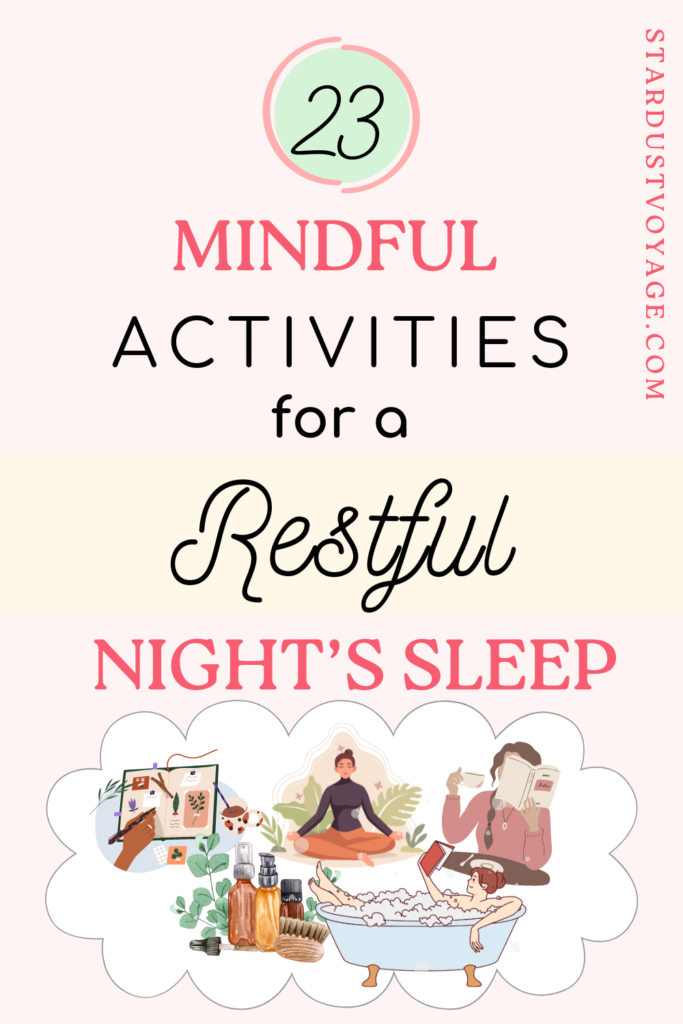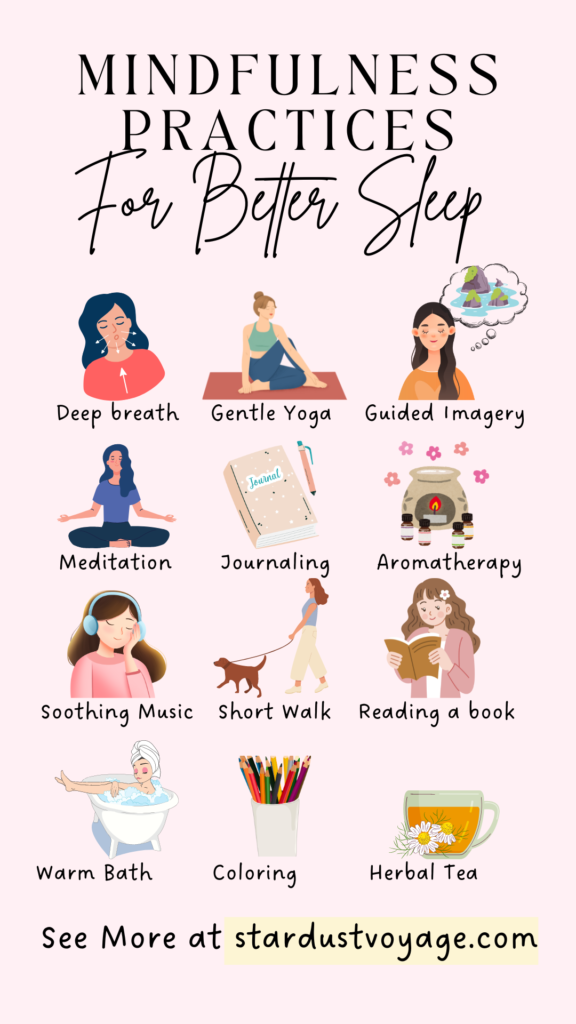Picture this: it’s late at night, you’re nestled in your bed, but your mind is racing with the day’s events, future plans, and a never-ending to-do list. You toss and turn, seeking the elusive comfort of sleep. This common scenario underscores a simple truth—many of us struggle to unwind and relax before bed. However, integrating mindfulness activities into your nightly routine can transform your sleep experience. Here, we delve into 23 effective and engaging mindfulness activities that can help you wind down, relax, and enjoy a restful night’s sleep.

- 1. Deep Breathing Exercises
- 2. Progressive Muscle Relaxation
- 3. Guided Imagery
- 4. Body Scan Meditation
- 5. Journaling
- 6. Aromatherapy
- 7. Mindful Eating
- 8. Gentle Yoga
- 9. Listening to Soothing Music
- 10. Mindful Walking
- 11. Reading a Book
- 12. Warm Bath
- 13. Meditation
- 14. Coloring
- 15. Practicing Gratitude
- 16. Creating a Sleep-Inducing Environment
- 17. Digital Detox
- 18. Listening to a Sleep Podcast
- 19. Practicing Tai Chi
- 20. Engaging in Creative Hobbies
- 21. Drinking Herbal Tea
- 22. Practicing Self-Massage
- 23. Practicing Acceptance
- Conclusion: Embrace Mindfulness for Better Sleep
1. Deep Breathing Exercises
Let’s begin with deep breathing exercises, a foundational technique in mindfulness. Find a quiet space, sit or lie down comfortably, and close your eyes. Inhale deeply through your nose, filling your lungs and allowing your abdomen to rise. Hold the breath for a moment, then exhale slowly through your mouth, letting go of tension. Focus solely on the rhythm of your breath. This simple yet powerful practice can calm your mind and body, signaling it’s time to relax.
2. Progressive Muscle Relaxation
Progressive muscle relaxation is a technique that helps you recognize and release physical tension. Start at your toes and work your way up to your head. Tense each muscle group for a few seconds as you inhale deeply, then release as you exhale slowly. This method not only reduces physical tension but also helps you become more attuned to your body’s stress signals.
3. Guided Imagery
Guided imagery is akin to taking a mental vacation. Close your eyes and visualize a serene place—a beach, a forest, or a meadow. Engage all your senses: hear the gentle waves, smell the fresh pine, feel the warmth of the sun on your skin. This immersive mental escape can shift your focus away from stress and toward a state of relaxation.
4. Body Scan Meditation
Body scan meditation is an excellent way to connect with your physical state. Lie down and bring your attention to different parts of your body, starting from your toes and moving up to your head. Notice any sensations, tension, or discomfort without judgment. This practice fosters a deeper awareness of your body, helping you release accumulated stress and drift into sleep.
5. Journaling
Journaling before bed can be incredibly therapeutic. Spend a few minutes writing down your thoughts, feelings, and experiences from the day. Note what you’re grateful for and any worries you have. This process helps clear your mind and reduce nighttime anxiety, creating a mental space conducive to sleep.
6. Aromatherapy
Aromatherapy uses essential oils to promote relaxation. Scents like lavender, chamomile, and sandalwood are known for their calming properties. Use a diffuser to fill your room with a soothing aroma, or apply a few drops of essential oil to your pillow. The calming scent can help ease your mind and body into a restful state.
7. Mindful Eating
Mindful eating can be a relaxing bedtime ritual. Choose a small, healthy snack, and eat it slowly, savoring each bite. Pay attention to the texture, taste, and aroma of the food. This practice shifts your focus from stress to something pleasurable and grounding, helping you wind down.

8. Gentle Yoga
Gentle yoga can prepare your body for sleep. Focus on stretches and poses that promote relaxation, such as child’s pose, legs up the wall, and reclined butterfly pose. Pair these movements with deep, slow breathing. Yoga helps release physical tension and calm the mind, setting the stage for restful sleep.
9. Listening to Soothing Music
Music has a powerful effect on our emotions and physical state. Create a playlist of soft, calming music to listen to as you wind down. Choose tracks with slow tempos and gentle melodies. Music can slow your heart rate and breathing, creating a peaceful atmosphere conducive to sleep.
10. Mindful Walking
A short, mindful walk in the evening can clear your mind and prepare you for sleep. Focus on your steps, the rhythm of your breath, and the sights and sounds around you. This practice helps you transition from the busyness of the day to a more relaxed state, making it easier to fall asleep.
11. Reading a Book
Reading a physical book (not an e-book with a backlit screen) can be a soothing way to end the day. Choose a book with a light, engaging story that doesn’t stimulate your mind too much. The act of reading can divert your thoughts from daily stresses and help you unwind, making sleep come more easily.
12. Warm Bath
A warm bath before bed can work wonders for your sleep. The warm water soothes your muscles and helps your body temperature drop afterward, which can signal to your body that it’s time to rest. Add some Epsom salts or a few drops of essential oils for an extra touch of relaxation. The combination of warmth and soothing scents creates an ideal environment for winding down.
13. Meditation
Meditation is a cornerstone of mindfulness practices. Sit or lie down comfortably, close your eyes, and focus on your breath or a mantra. When your mind wanders, gently bring it back to your point of focus. Regular meditation practice can improve sleep quality by reducing stress and promoting a sense of calm.
14. Coloring
Adult coloring books have gained popularity as a relaxing activity. Spend some time coloring before bed to shift your focus from worries to something creative and enjoyable. This simple yet effective way to unwind can help you transition smoothly into sleep.
15. Practicing Gratitude
Reflecting on what you’re grateful for can shift your mindset from stress to positivity. Before bed, write down three things you’re grateful for. This practice enhances your mood and creates a more peaceful state of mind, making it easier to fall asleep with a smile.

16. Creating a Sleep-Inducing Environment
Your bedroom should be a sanctuary for sleep. Keep it cool, dark, and quiet. Invest in a comfortable mattress and pillows, and remove electronic devices and clutter. Creating an optimal sleep environment can make it easier for you to relax and drift off.
17. Digital Detox
The blue light from screens can interfere with your sleep. Implement a digital detox an hour before bed. Use this time to engage in other relaxing activities like reading, meditating, or spending time with loved ones. Reducing screen time before bed can significantly improve your sleep quality.
18. Listening to a Sleep Podcast
There are many podcasts designed to help you sleep. These often include soothing stories, calming sounds, or guided meditations. Find a podcast that resonates with you and let it lull you to sleep. The gentle narrative can divert your mind from stress, creating a peaceful path to slumber.
19. Practicing Tai Chi
Tai Chi is a gentle form of martial arts that promotes relaxation and balance. Practicing Tai Chi before bed can help reduce stress and prepare your mind and body for sleep. Focus on slow, deliberate movements and deep breathing. This practice harmonizes your body and mind, making it easier to transition to sleep.
20. Engaging in Creative Hobbies
Creative activities like knitting, drawing, or writing can be very relaxing. Spend some time on a hobby you enjoy before bed. Engaging in a creative pursuit can shift your focus from the day’s stresses to something enjoyable and calming, setting the stage for a good night’s sleep.
21. Drinking Herbal Tea
Herbal teas like chamomile, valerian root, and peppermint are known for their calming effects. A warm cup of herbal tea before bed can help soothe your mind and body, making it easier to fall asleep. The ritual of brewing and sipping tea can also become a calming nightly routine.
22. Practicing Self-Massage
A gentle self-massage can help release tension and promote relaxation. Focus on areas where you hold stress, such as your neck, shoulders, and feet. Use slow, circular motions to ease muscle tension and improve circulation. This practice can help you wind down and prepare for sleep.
23. Practicing Acceptance
Acceptance is a powerful tool in reducing stress and improving sleep. Acknowledge any worries or thoughts without judgment, and remind yourself that it’s okay to feel this way. Practicing acceptance can help you let go of stress and create a more peaceful state of mind. Embracing this mindset can pave the way for a restful night’s sleep.

Conclusion: Embrace Mindfulness for Better Sleep
Incorporating mindfulness activities into your bedtime routine can make a significant difference in your sleep quality. These practices help to calm the mind, reduce stress, and prepare your body for rest. Experiment with different activities to find what works best for you, and remember, the key is consistency. Make these mindfulness activities a regular part of your routine, and enjoy the benefits of a peaceful, restful night’s sleep.








